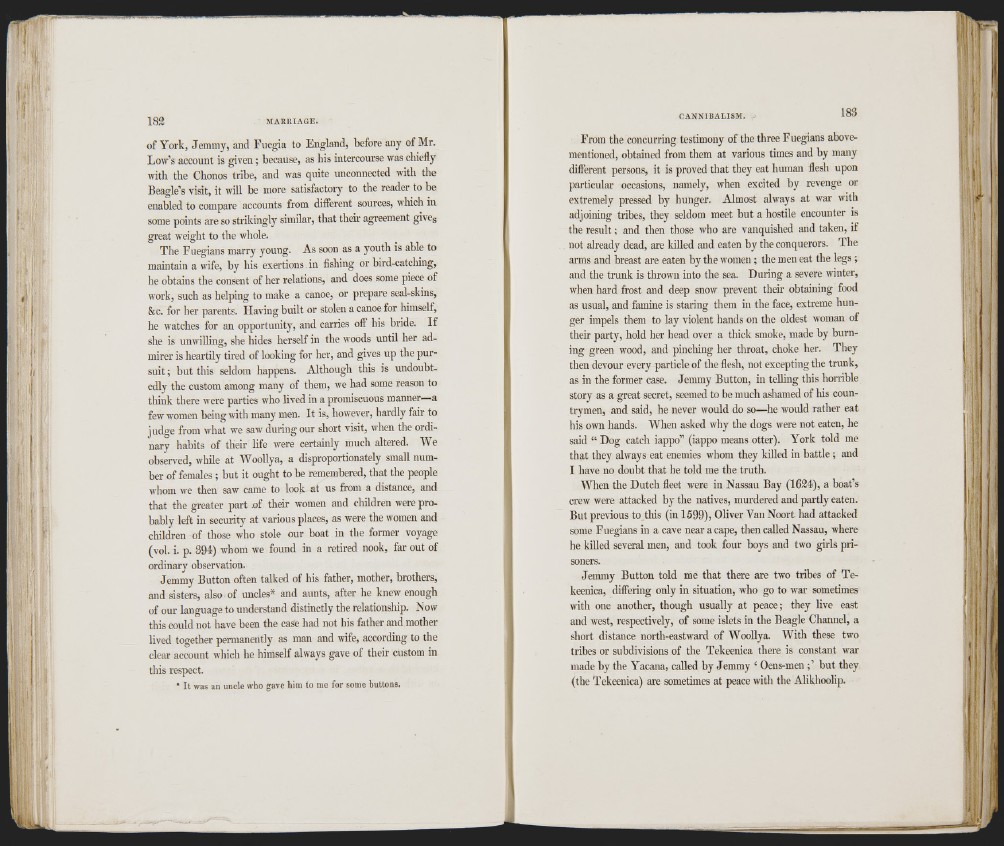
. i : '
- f
182 MAKl l IAGE.
of York, Jemmy, and Fuegia to England, before any of Mr.
Low’s account is given ; because, as his intercourse was chiefly
with the Chonos tribe, and was quite unconnected with the
Beagle’s visit, it will he more satisfactory to the reader to be
enabled to compare accounts from different sources, which in
some points are so strikingly similar, that theft agreement giveg
great weight to the whole.
The Fuegians marry young. As soon as a youth is ahle to
maintain a wife, by his exertions in fishing or bird-catching,
he obtains the consent of her relations, and does some piece of
work, such as helping to make a canoe, or prepare seal-skins,
&c. for her parents. Having built or stolen a canoe for himself,
he watches for an opportunity, and carries off his bride. I f
she is unwilling, she hides herself in the woods until her admirer
is heartily tired of looking for her, and gives up the pursuit;
but this seldom happens. Although this is undoubtedly
the custom among many of them, we had some reason to
think there were parties who lived in a promiscuous manner—a
few women being with many men. It is, however, hardly fair to
j udge from what we saw during our short visit, when the ordinary
habits of their life were certainly much altered. We
observed, while at Woollya, a disproportionately small number
of females ; but it ought to be remembered, that the people
whom we then saw came to look at us from a distance, and
that the greater part of theft women and children were probably
left in security at various places, as were the women and
children of those who stole our boat in the former voyage
(vol. i. p. 394) whom we found in a retired nook, far out of
ordinary observation.
Jemmy Button often talked of his father, mother, brothers,
and sisters, also of uncles* and aunts, after he knew enough
of our language to understand distinctly the relationship. Now
this could not have been the case had not his father and mother
lived together permanently as man and wife, according to the
clear account which he himself always gave of their custom in
this respect.
• It was an uncle who gave him to me for some buttons.
ill
mi
» 7 |
llM
‘ fI !
CANNIBALISM. 183
From the concurring testimony of the three Fuegians above-
mentioned, obtained from them at various times and by many
different persons, it is proved that they eat human flesh upon
pai-ticular occasions, namely, when excited hy revenge or
extremely pressed by hunger. Almost always at war with
adjoining tribes, they seldom meet but a hostile encounter is
the result; and then those who are vanquished and taken, if
not already dead, are killed and eaten by the conquerors. The
arms and breast are eaten by the women ; the men eat the legs ;
and the trunk is thrown into the sea. During a severe winter,
when hard frost and deep snow prevent their obtaining food
as usual, and famine is staring them in the face, extreme hunger
impels them to lay violent hands on the oldest woman of
their party, hold her head over a thick smoke, made by burning
green wood, and pinching her throat, choke her. They
then devour every particle of the flesh, not excepting the trunk,
as in the former case. Jemmy Button, in teUing this horrible
story as a great secret, seemed to be much ashamed of his countrymen,
and said, he never would do so—he would rather eat
his own hands. When asked why the dogs were not eaten, he
said “ Dog catch iappo” (iappo means otter). York told me
that they always eat enemies whom they kiUed in battle ; and
I have no doubt that he told me the truth.
When the Dutch fleet were in Nassau Bay (1624), a boat’s
crew were attacked by the natives, murdered and partly eaten.
But previous to tliis (in 1599), Oliver Vau Noort had attacked
some Fuegians in a cave near a cape, then called Nassau, where
he kiUed several men, and took four boys and two gftls prisoners.
Jenmiy Button told me that there are two tribes of Te-
keenica, differing only in situation, who go to war sometimes
with one another, though usually at peace; they live east
and west, respectively, of some islets in the Beagle Channel, a
short distance north-eastward of WooUya. With these two
tribes or subdivisions of the Tekeenica there is constant war
made by the Yacana, called by Jemmy ‘ Oens-men ;’ but they
(the Tekeenica) are sometimes at peace with the Alikhoolip.
Ii4
:t i
I !
'!'S